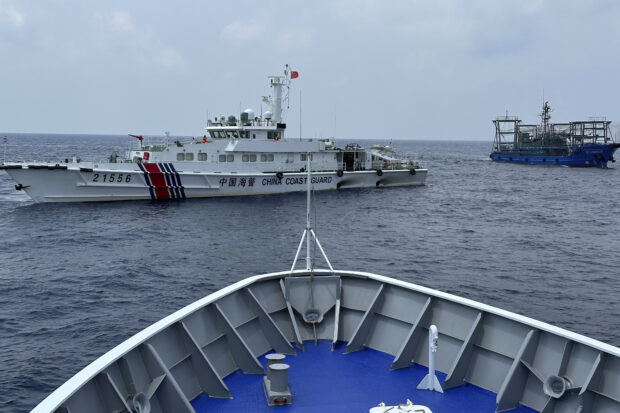PH must have one official spokesperson in addressing WPS policies — Gatchalian

FILE – A Chinese coast guard ship, left, with a Chinese militia vessel, right, blocks Philippine coast guard ship, BRP Sindangan as it tried to head towards Second Thomas Shoal at the disputed South China Sea during rotation and resupply mission on Oct. 4, 2023. A Chinese coast guard ship and one of its militia vessels separately bumped a Philippine coast guard ship and a military-run supply boat Sunday, Oct. 22 off a disputed shoal, Philippine officials said. (AP Photo/Joeal Calupitan, File)
MANILA, Philippines — The Philippines needs to have just one person talking about policies regarding the West Philippine Sea (WPS), to avoid any confusion or contradictory statements according to Senator Win Gatchalian.
In a virtual briefing on Friday, Gatchalian said that while different officials may harbor the same messages — insist on the Philippines’ rights to the West Philippine Sea and the country’s exclusive economic zone (EEZ) — the delivery might differ from one person to another.
“Well I think kung ako tatanungin, it’s better to have one singular voice when it comes to the West Philippine (Sea) issue. Although pareho naman ‘yong mensahe, pero importante rin na […] alam lahat kung ano ‘yong dapat sabihin que sa marami ang nagsasalita,” Gatchalian told reporters.
(Well if you were to ask me, it’s better to have one singular voice when it comes to the West Philippine (Sea) issue. Although they have the same statements, it is important that people talking know what they are discussing, rather than having many people voicing out their concerns.)
“Kaya I would like to see a singular voice that will echo the sentiments and the position of the government,” he added.
Gatchalian explained that while strong-worded statements against China’s incursion in the WPS are good to hear, it does not resolve anything.
“Now having said that, ‘yong mga lumalabas sa media, of course natutuwa ‘yong mga sarili nating mga audiences, natutuwa ‘yong mga Chinese, natutuwa tayo bilang Pinoy, pero may nare-resolba ba? So importante rin ‘yong backchanneling mabuhay ‘yan at magtuloy-tuloy because kahit walang influence ‘yang nangyayari, nakakapag-usap sila nang masinsinan at meron silang pwedeng resolusyon na may mangyari,” he said.
(Now having said that, what is stated before the media, of course our audiences are happy, the Chinese rejoice, we are happy as Filipinos, but does it resolve anything So it is also important for backchanneling to be revived because even if does not have any strong influence, at least they can talk seriously and intently and possibly arrive at a resolution.)
“But if they do the backchanneling, hopefully, optimistically, they might find solutions maybe not on a permanent basis but at least achieve peace and stability in the region. Kasi itong ganitong sitwasyon, lahat tayo nagagalit, at kapag nagagalit tayo, wala tayong nakikitang solusyon. Pero hindi rin maganda ‘yan in the short term and in the long term, importante rin na makakita tayo ng solusyon, mahirap man, pero at least makahanap tayo ng common solution,” he added.
(But if they do the backchanneling, hopefully, optimistically, they might find solutions maybe not on a permanent basis but at least achieve peace and stability in the region. Because currently, we are all mad — and if we are mad, we cannot see any possible solution. Because being mad is not good for the short term and the long term, so it’s important to seek solutions, which may be hard to find.
As to who can possibly do backchannel talks with China regarding the issue, Gatchalian said that person can be someone outside of the Department of Foreign Affairs (DFA) who has maintained a good relationship with China.
“Ito kasi mga soft approaches to eh, when you say backchanneling, it can be outside of DFA who has good relationship with China, who can have frank discussions, and who can deliver the message of our President,” he said.
“So it can be someone outside of the DFA, but trusted by the President,” he added.
Gatchalian’s statements came a day after the DFA confirmed that Foreign Affairs Secretary Enrique Manalo and Chinese foreign minister Wang Yi had a telephone conversation where both sides noted the importance of using dialogue in seeking peaceful resolutions to the WPS issue.
READ: PH, China note dialogue’s value in addressing issues — DFA
The discussion between Manalo and Yi came months after several incidents between the two countries’ coast guard vessels over the WPS.
No less than President Ferdinand Marcos Jr. admitted that the confrontations — civilian supply ships escorted by the Philippine Coast Guard which will be hit or water cannoned by the Chinese Coast Guard — have fallen into a predictable patter.
Marcos reasoned out that after these confrontations, the Philippines Philippines would engage in traditional methods of diplomacy after each incident by sending a note verbal, and the Philippine Embassy would send a démarche to the Chinese Foreign Ministry.
To avoid this, Marcos said he is eyeing radical solutions in the WPS as diplomatic efforts have failed to stop the growing incidents of China’s incursion.
RELATED STORIES
China ship hits PH vessels on humanitarian drive with water cannon in West PH Sea
Diplomatic efforts fail: Marcos eyes radical solution in West PH Sea row
For comprehensive coverage, in-depth analysis, visit our special page for West Philippine Sea updates. Stay informed with articles, videos, and expert opinions.